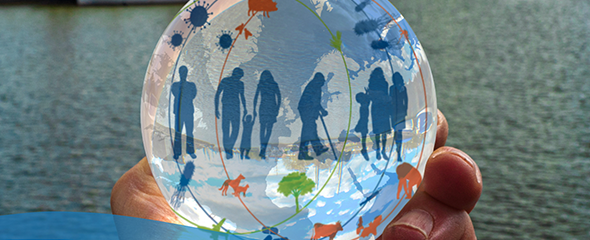The One Health-Region Vorpommern shall focus on health in all dimensions of human activity and consider the knock-on effects of all decisions made by politics, agriculture, conservation or tourism on health. In order to attain this goal, individual workshop projects will be geared towards selected target groups. For example, the HIOH project with school pupils will develop a fly-based monitoring system for wild animals and antimicrobial resistances, a One Health ScienceTheatre will raise awareness for a global approach to health among inhabitants of rural regions, a communication project would like to draw Vorpommern’s citizens attention to the topic of One Health and enable them to get involved at interactive conferences. The alliance plans to focus on acute problems faced by the region, which are proven to restrict or endanger health and quality of life, in particular antimicrobial resistance, illnesses originating from agriculture, or animal epidemics.
Prof Steffen Fleßa, Chair of General Business Administration and Health Care Management at the University of Greifswald and coordinator of the alliance, considers health to be a global task that is the responsibility of the healthcare system, politics, industry and society: “The farmer, who decides how he wants to use his land should also consider the effects of his decision on the health of humans and animals. The hotel owner planning his breakfast offer should also have the health of his guests in mind. And of course, the politician, who is, for example, responsible for road construction should also think about the health of nature and humans,” claims Fleßa.
Prof Katharina Riedel, Rector of the University of Greifswald, adds: “Immense social challenges, such as climate change or the worldwide increase in the number of infectious diseases can only be solved if we change human lifestyle to improve our own health. Through education, research, and innovation, combined with the effective transfer of ideas, knowledge, and technologies, we will be able to fight infections and multidrug resistances, use the environment sustainably and make positive changes to our region as the innovation motor and driving force behind regional structural developments.”
The HIOH will conduct a sustainable Citizen Science project with students to investigate the impact of urbanisation, agriculture and climate change on the biodiversity of wildlife with their zoonotic pathogen reservoirs and antimicrobial resistance (AMR) in the environment (CIFLY project). Students together with scientists will develop a fly-based surveillance system for wildlife and AMR in Vorpommern-Greifswald based on the latest research results in the field of environmental DNA and bacteriology. The project is primarily a knowledge transfer and educational promotion in the field of One Health with tangible science.
The alliance was one of twelve successful alliances from 115 proposals and will receive up to 18 million euros over the course of the next nine years from the Federal Ministry of Education and Research (BMBF) as part of the programme ‘T!Raum – TransferRäume für die Zukunft von Regionen’.
To the press release by the University of Greifswald
Further information
Project partners: CEVA Tiergesundheit GmbH Greifswald, Research Centre for Farm Animal Biology Dummerstorf, Friedrich-Loeffler-Institut for Animal Health Greifswald, Greifswalder Agrarinitiative e. V., Helmholtz Institute for One Health Greifswald, Opernale INSTITUT für Musik & Theater in Vorpommern e. V., RinderAllianz GmbH, Schweisfurth Foundation, University of Greifswald, University Medicine Greifswald, University and Hanseatic Town of Greifswald
